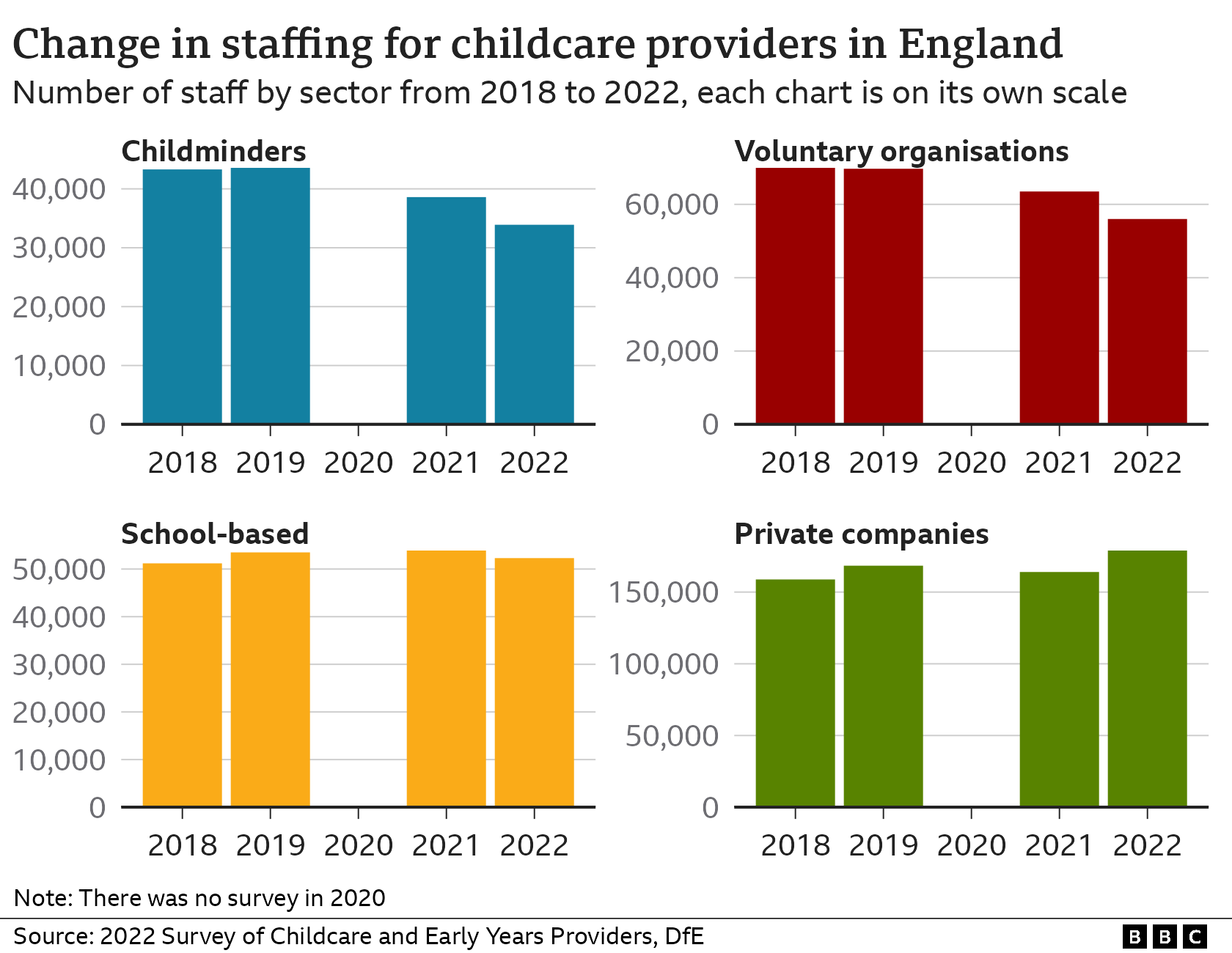Let childminders work in own homes, landlords urged
- Published

Childminders should be allowed to work from their rented homes to boost childcare availability for families, the government has said.
Children's Minister Claire Coutinho has written to housing associations, social landlords and developers in England to urge them to review restrictive clauses in tenant contracts.
But the Early Years Alliance said this would make only a small difference.
The government has promised a huge expansion of free childcare in England.
However, organisations representing the sector have warned there are not enough places to deliver this pledge, and childminders say they are leaving the job because government funding does not cover their costs.
The number of childminders operating in England has more than halved over the past 10 years, the Department for Education said.
It said blanket bans in tenant contracts, mortgage agreements or restrictive covenants for leasehold properties on using a home for business purposes was one reason more people were not signing up to be childminders.
One in eight prospective childminders who did not complete the registration process were unable to do so because they could not secure permission to work from their home, according to data collected by the agency Tiney.
Minister Ms Coutinho said: "Too often prospective childminders are having the door slammed in their faces because they face a blanket ban on working from home.
"However, parents tell us time and again how much they value the flexibility and quality that childminders bring so we are making sure that we are supporting the workforce to deliver what parents need."
Natalia Baran, who is a childminder in London, said it had been a "nightmare" trying to find a landlord who would agree to her running her business from their property.
She previously worked as a nanny but when she had to find her own house to work from Ms Baran said it took her six months to find a landlord who would accept her, while 80% of estate agents said they could not help.
"The stress was unbearable," she told the BBC.
She has now been given notice by her current landlord that they want the property back so is now in the same situation again.
Ms Baran welcomed the government's announcement, adding that it was important landlords were aware they could rent to childminders.
The National Residential Landlords Association said housing providers were not the issue and called for mortgage lenders and insurers to be more flexible, as well as for tenancy deposits to be allowed to reflect the greater risk of damage to properties used for childminding.

The government has already made other proposals to encourage childminders to remain in the profession, including allowing them to spend more time working outside their own homes, such as in a community centre or village hall.
It said it would consult on reducing registration times to around 10 weeks and ensure childminders are paid monthly by local authorities.
Childcare start-up grants, worth up to £1,200, are also being launched.
However, the Early Years Alliance, which represents the sector in England, accused the government of wasting time and resources "by putting forward changes to minor challenges that in reality, will make a small amount of difference".
Chief executive Neil Leitch said the latest announcement would "fail to rectify or even slightly remedy the issues facing England's childminding sector".
He said childminders continued to be "underfunded, undervalued and underappreciated" and the sector needed "a long-term plan supported by realistic funding".
Labour said asking landlords to step in was a "pathetic effort to make up for years of neglect".
The government said it had already boosted the funding rates paid to early years providers, including childminders, to deliver free hours - from an average of £5.29 to £5.62 for three and four-year-olds, and from £6.00 to £7.95 for two-year-olds.
However, the sector says the cost of providing these places in much higher and childminders have told the BBC this is a major reason many are leaving the sector.
In March's Budget, the government announced the current scheme offering some families in England 30 free hours of childcare per week for three and four-year-olds would be extended to cover children as young as nine months.
The changes will be phased in, starting with 15 hours free childcare per week for eligible parents of two-year-olds from April next year.
Meanwhile, the government is urging parents to check they are claiming all their existing free childcare entitlements, with just 10 days to go to register for the autumn term.

Are you affected by the issues raised in this story? You can get in touch by emailing haveyoursay@bbc.co.uk, external.
Please include a contact number if you are willing to speak to a BBC journalist. You can also get in touch in the following ways:
WhatsApp: +44 7756 165803
Tweet: @BBC_HaveYourSay, external
Please read our terms & conditions and privacy policy
If you are reading this page and can't see the form you will need to visit the mobile version of the BBC website to submit your question or comment or you can email us at HaveYourSay@bbc.co.uk, external. Please include your name, age and location with any submission.
- Published23 July 2023

- Published18 March 2023

